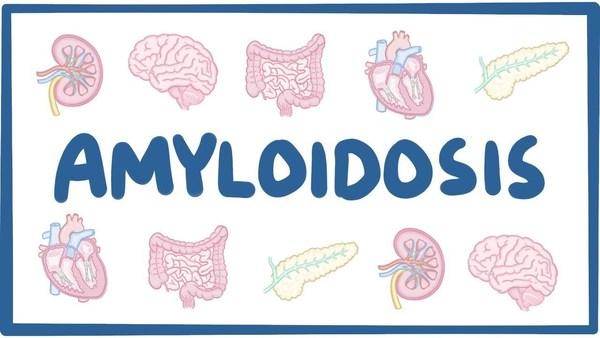General informations
Amyloidosis is a pathological process in which the deposition of an abnormal amyloid protein occurs in organs and tissues. With this disease, the kidneys are most often affected. The amyloidosis is a rare disease process, which is also very badly checked and treatable.
As a rule, the disease occurs in the elderly.
In highly specialized clinics, all modern informative methods for the diagnosis of amyloidosis are used. In addition, German specialists prescribe treatment in accordance with all international standards and protocols.
Depending on the type of pathological protein that affects organs and tissues, the following types of amyloidosis are distinguished:
- Amyloidosis AL . It occurs mainly and in most cases in patients with this type of myeloma is also detected;
- AA amyloidosis - is a secondary disease resulting from chronic pathological processes (especially against the background of familial Mediterranean fever);
- ATTR-amyloidosis is an inherited form of the pathological process, which manifests itself in polyneuropathy and senile familial amyloidosis;
- A2M amyloidosis occurs in hemodialysis patients.
To date, the exact causes of this disease are not known. Some importance is attached to the heredity and genetic characteristics of the patient.
Causes of the disease and symptoms
Symptoms of amyloidosis
The clinical picture of this pathological process for a long time does not appear. Therefore, the patient does not even suspect that he has a disease.
The severity of symptoms and syndromes depends on the type of amyloidosis, the age of the patient, concomitant diseases, and also the organs and tissues affected by the pathological process.
As a rule, amyloidosis is manifested by the following clinical symptoms:
- Kidney damage. As manifested as proteinuria (protein in urine), hypercholesterolemia, edema and progressive renal failure also occur. In some cases (with hyponatremia) edema may not occur;
- Amyloidosis of the heart is manifested by restrictive cardiomyopathy, progression of heart failure, arrhythmias and conduction disturbances;
- Damage to the gastrointestinal tract - for a long time has not been determined. Not all clinical symptoms are specific;
- Cutaneous amyloidosis is manifested by the appearance of specific translucent papules and plaques on the skin of the face and neck. Often, patients have a pathognomonic symptom of “raccoon eyes” - periorbital bruising. In advanced cases, swelling of the hands occurs;
- Damage to the central nervous system manifests as Alzheimer's disease;
- Hemorrhagic syndrome occurs due to insufficient synthesis of blood coagulation factors and manifests itself as nosebleeds, petechiae and bruising;
Diagnosis of amyloidosis
The attending physician always attaches great importance to the data of the patient investigation and examination. Recognition of amyloidosis in the early stages is almost impossible. If the specialist suspects the presence of this pathology in the patient, special studies are prescribed. Also, patients with amyloidosis are recommended to consult close specialists in order to determine the damage to other organs and systems.

Biochemical blood test
As a rule, the following laboratory and instrumental studies are prescribed for all patients with suspected amyloidosis:
- Complete blood and leukocyte count;
- General urine analysis (proteinuria is observed, which can very often be massive);
- Lipid profile (increased cholesterol concentration);
- Biochemical blood test with determination of the concentration of total bilirubin and its fractions, total protein, creatinine, urea, uric acid, alkaline phosphatase, etc.
- Coagulogram;
- X-ray examination of the chest;
- ECG
- Echocardiography;
- Ultrasound of the abdominal cavity and retroperitoneal space;
- Brain MRI (with suspected Alzheimer's disease);
- A biopsy of the kidneys, of the intestinal mucosa, followed by a morphological examination of the biological material.
Diagnosis and treatment
AFRICAN HERBAL REMEDY TO TREAT AMYLOSIS
The treatment we offer consists of medicinal herbs, plants and roots whose properties will relieve the symptoms of amyloidosis and slow its progression. The anti-inflammatory, diuretic, and purifying properties among others of our remedies will be beneficial to people suffering from diseases of the kidneys, lymphatic glands, spleen, liver, nervous and cardiovascular system.
Our treatment is not intended to completely treat the disease, but rather to slow its progression and relieve the various symptoms of the disease. Indeed the natural remedy that we offer is made up of plants with anti-inflammatory properties. It will also purify your blood and its diuretic properties will be beneficial if you have kidney , lymph node and spleen disease . For people suffering from nervous and cardiovascular disease, these plants will restore the functioning of these different systems. Our treatment is an all-in-one for the treatment of amyloidosis.
To discover the natural solution to treat amyloidosis, click here
We deliver all over the world.
For more information, you can contact our experts on +229 51374202 direct line or by whatsapp at the same number.
Treatment of amyloidosis with pharmaceuticals

To date, there is no effective therapeutic method that can completely save the patient from the disease. The main goal of the treatment of amyloidosis is to reduce the synthesis of pathological protein production and its deposition in organs and tissues. Only in this way can the quality and longevity of the patient be affected.
If the deposition of pathological proteins occurs a second time (due to other chronic diseases), it is first necessary to review the treatment of the underlying disease and prescribe the necessary treatment. Only in this way can amyloid synthesis be reduced.
Pharmacological preparations
Primary amyloidosis requires the appointment of specific pharmacological preparations, which include:
- Chemotherapeutic agents in combination with other drugs in the initial stages of the disease effectively reduce the synthesis of amyloid and its deposition in organs and tissues;
- Prednisone hormone therapy significantly suppresses the immune system, which positively affects the treatment of the patient;
- Colchicine is an anti-inflammatory drug of plant origin. The use of colchicine in the early stages of amyloidosis (before significant kidney damage) may further delay the development of nephropathy;
- Peritoneal dialysis is performed for patients with advanced stages of amyloidosis. Thanks to dialysis, a significant amount of pathological proteins are eliminated from the patient's body.
In the terminal stages of amyloidosis, nephropathy and chronic renal failure occur, leading to death of patients. In German clinics, specialists perform kidney transplantation, which can significantly extend the life of patients. Also recently, liver transplantation operations have been well established for the treatment of amyloidosis. After such surgical interventions, the pathological protein is no longer synthesized, since the production of its predecessor, transthyretin, is eliminated.
To discover the natural solution to treat amyloidosis, click here
We deliver all over the world.
For more information, you can contact our experts on +229 51374202 direct line or by whatsapp at the same number.


